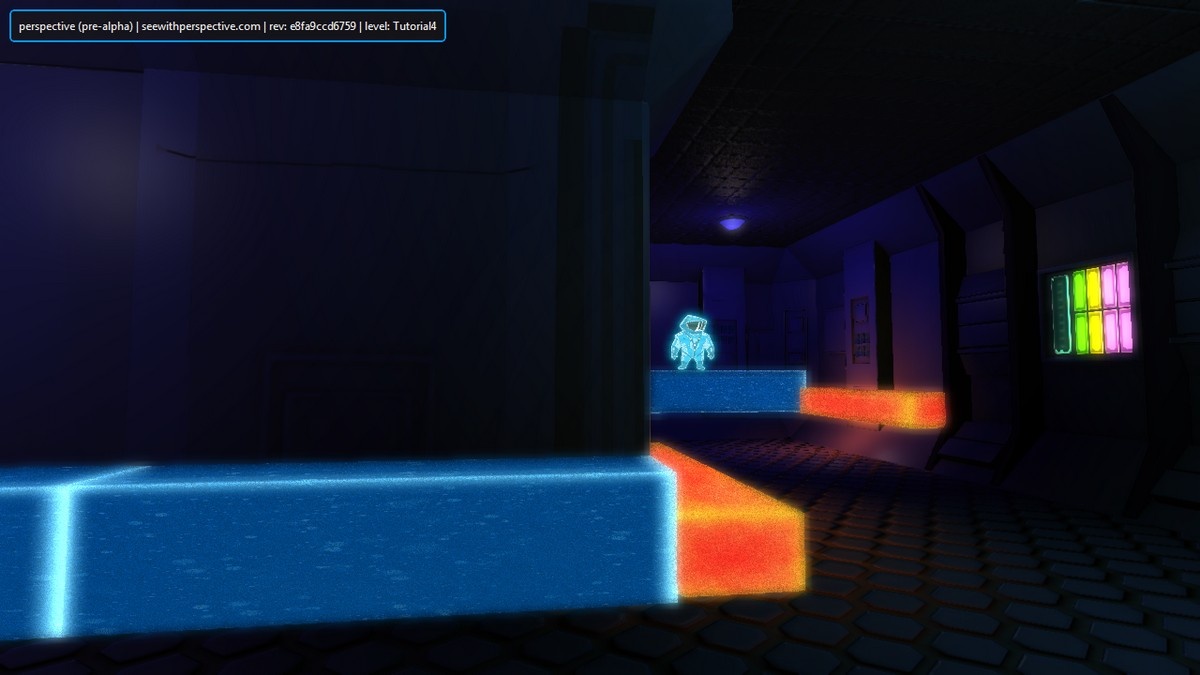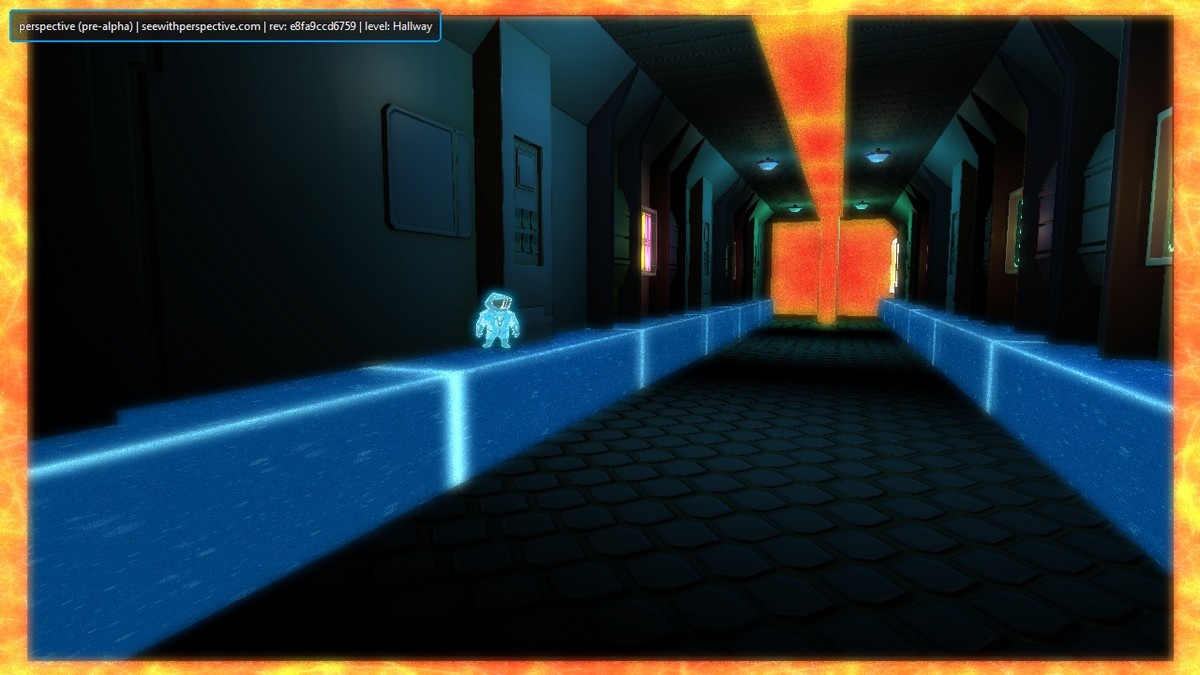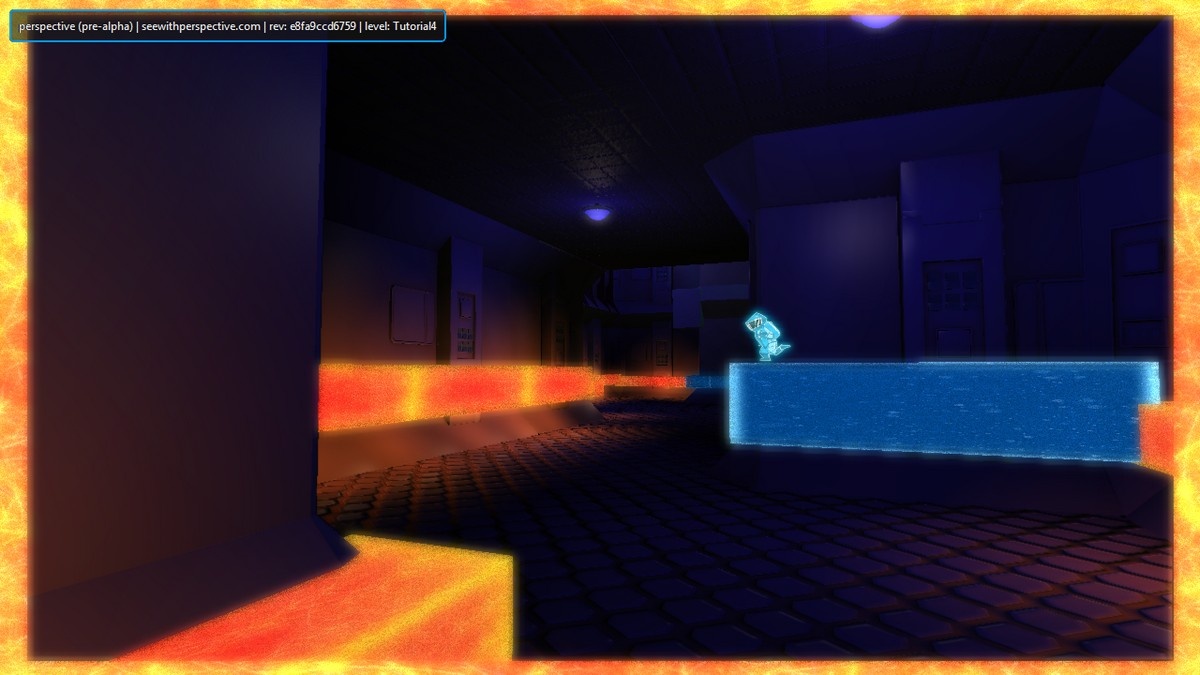Perspective on Perspective
We chat with the creators of Perspective, an experimental first-person puzzler, about their inspirations, goals, and perspectives.
A couple of months back GameSpot was alerted to an interesting student game from the DigiPen Institute of Technology called Perspective. The game is an experimental first-person puzzler in which you control a camera and avatar in both 2D and 3D spaces. Perspective features familiar game mechanics that have been featured in games like Fez, Braid, and Echochrome, but it takes those elements and brings fresh twists that make you question and rethink how you would normally solve a puzzle.
For some extra insight into this unorthodox puzzler, Perspective creators Pohung Chen, Logan Fieth, MJ Quigley, and Eddie Peters, share their story of how this game came together.
Did you have any specific goals in mind for the game?
Pohung Chen: We stumbled upon the core mechanics behind Perspective pretty early on. Our goal was to create a game that explores those mechanics in new and interesting ways. From the start we knew that this is a game that would have a lot of challenges. These challenges ranged from getting the core technology working to designing the game in such a way that carefully balanced between difficulty and approachability.
Logan Fieth: My goal from the start was to make fun puzzles with the mechanic. It sounds weird, but the mechanic is “overpowered” in a lot of ways. The player could potentially break a lot of puzzles with the mechanic, so I had to strike a balance between limiting the player and letting them roam free.
The other goal I have had with the level design is to keep the game from being reflex-intensive. Yes, you do control a platforming character, but the player should never feel like they are performing a platforming challenge. The goal is for all of the levels to be focused on the puzzle-solving.
Minecraft – Kung Fu Panda DLC Trailer Sclash - Console Release Date Trailer Kingdom Come: Deliverance 2 - Official Cinematic Announcement Trailer Stellar Blade - BIBI ‘Eve’ Official Music Video Trailer | PS5 Apex Legends: Urban Assault Collection Event Trailer Total War: WARHAMMER III - Elspeth von Draken Gameplay Showcase Potionomics: Masterwork Edition - Official Announcement Trailer Genshin Impact - "Arlecchino: Sleep in Peace" | Official Character Teaser Snowbreak: Containment Zone - "Gradient of Souls" Version Trailer Harold Halibut GameSpot Video Review Nancy Drew: Mystery of the Seven Keys | World Premiere Official Trailer Modern Warfare III & Warzone - Official Cheech & Chong Bundle Gameplay Trailer
Please enter your date of birth to view this video
By clicking 'enter', you agree to GameSpot's
Terms of Use and Privacy Policy
What was your inspiration for the game?
LF: As a kid, bored in the backseat of a car, I would daydream and imagine a little character running alongside the car. At that age, I thought I was the only one who did this. It turns out that plenty of people had similar imaginations, so it resonates with people! The inspiration for the game comes from that in many ways. It’s about the implications of the rule set, and how that character would move through the world if his world was tangible.
As a level designer, I always look back at Braid. It has amazing level design, and it’s a perfect example of cutting out the fluff and keeping only the best parts.
Also, it’s probably obvious, but Portal is a big inspiration. How could it not be?
Did Echochrome influence Perspective?
LF: Short answer: no. Player expectations are interesting, because until our trailer leaked and we got comments on it, I thought the differences between Perspective and other games like Echochrome and Fez were clear. Now I realize that players really just need to get their hands on it to see what the game is really like. In fact, I learned quickly that designing levels for the game was going to, in some ways, take more from first-person games than puzzle games like Echochrome.
The gameplay makes you rethink the way you would approach a typical platformer. Can you elaborate on the gameplay a bit?
PC: Perspective is more of a puzzle game than it is a platformer. The platforming elements in Perspective aren’t meant to be difficult. It is more of a medium for us to create puzzles than a way to challenge your platforming skills.
What are your inspirations for the art direction and score?
Eddie Peters: Once the other artists and myself were hired on, the team spent a considerable amount of time weighing our options in terms of story and aesthetics in a way that would marry both to the game's mechanic. In the end, retro futurism led the inspirational charge. We spent some time looking at both classic films and games that represented how the future could have looked from the perspective of the ‘60's, as well as some newer sci-fi.
MJ Quigley: Early on the music was inspired by groups like Massive Attack and Boards of Canada and had a much more somber and spacey feel to it. But as time went on, it shifted more in the Boards of Canada direction with a sort of mysterious sound and then to a heavy influence from ‘60s and ‘70s documentary music (Carl Sagan’s Cosmos comes to mind), the original Tron soundtrack, and a little bit of classical influence. Vintage synthesizer sounds and old electric instruments fascinate me, so it was a great opportunity to experiment with emulating them and trying to see what could be done and what range of moods could be evoked through their distinguished sound.
Are you still in school? What advice do you have for kids who want to get into the video game industry?
PC: I’m a graduating senior at DigiPen. My advice is to make stuff and find people who are equally passionate about working on cool projects. Take those people, and find a way to meet on a regular basis to work really hard on creating something interesting. Once you have something playable, start putting it in front of people and watch how they interact with it, gauge how they feel, and think of ways to make that cool thing better.
Creating games is a practitioner’s art. You can sit around and write game design documents all you want, but that’s about as effective as preparing for an Olympic race by being a sports journalist.
MJ: I currently have a full-time job as an audio director and am trying to balance school with that. My first piece of advice would be to never do that for any reason. You can probably scrape by with a part-time job and school, or having a full-time job with half-time school. Don’t ever do both full-time. It’s not healthy.
"I learned quickly that designing levels for the game was going to, in some ways, take more from first-person games than puzzle games like Echochrome."My second piece of advice is to be sociable and be nice with everyone you work with. You never know who’ll get you a job recommendation, maybe even get you a job period. Never miss an opportunity to schmooze with people in the industry.
Lastly, focus on what you really like to do as it pertains to working on video games and get really good at it. You will be noticed for it.
LF: I am a graduating senior at DigiPen. My first piece of advice is to never let people tell you to do something the “normal” way. Find something you like, and do it, even if people say that you’ll never make a career out of it. Second, if you want to be a designer, specialize, but know your basics first. I didn’t touch the code or art at all with Perspective, but I’ve made plenty of games completely by myself. Third, playtest, and don’t be afraid of criticism. In fact, you want criticism. It means you know what problems to address. If players are only saying “I like it,” then they’re just trying to be nice. That, or you’re ready to ship the game, which is unlikely.
You can download Perspective here.
'Got a news tip or want to contact us directly? Email news@gamespot.com



Join the conversation